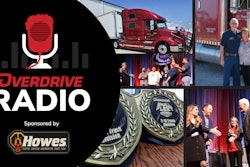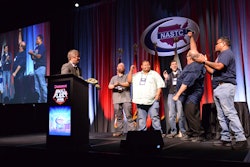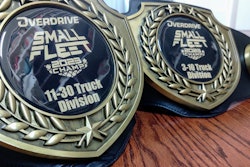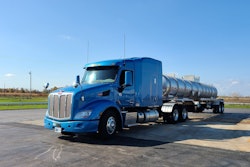"As I get older, I like electronic logbooks a lot better than I would have in my 20s. Now that I'm 63, I like that 10 hours off. My work ethic really started to wane when I found out that feed mills are open at noon. You didn't have to be there at 7 o'clock in the morning. You can get there at noon and still unload." --LNL Trucking small fleet owner and Overdrive 2023 Small Fleet Champ Larry Limp, cracking wise about one among the many big changes in trucking he's seen over his four-plus decades in the business.
Good humor? Yessir, LNL Trucking small fleet owner Larry Limp’s got plenty of that. Overdrive’s 2023 Small Fleet Champ in the 11-30-truck division, LNL’s built a solid direct customer business specializing mostly in animal fats pulled in 6,800- and 7,000-gallon stainless tanks to supply businesses in various production chains -- gear lubes, cutting oils, you name it. Based on Bedford, Indiana, Larry Limp’s sense of humor’s probably served him well in decidedly less-humorous endeavors than contemplating his own psychology and the shift to electronic logs in 2017, that’s sure.
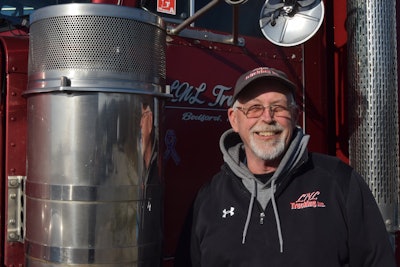 Larry Limp with his personal truck, with which he still hauls to the tune of around 70,000 miles annually, a 2000 Peterbilt 379.
Larry Limp with his personal truck, with which he still hauls to the tune of around 70,000 miles annually, a 2000 Peterbilt 379.
He’s served as Chairman of the Indiana Motor Truck Association, participates annually in the IMTA’s trips to Washington to visit with reps and Senators, and generally keeps his nose to the grindstone building business -- "hanging on" to business might be the better phrase in the current environment -- with a strong do-it-yourself ethic borne of 40-some years trucking. Almost all of that has been as an owner-operator and, now, small fleet owner.
Ahead of the Mid-America Trucking Show in Louisville last week, I ventured about an hour and a half’s drive north and west of the Kentucky town to Bedford, Indiana, to LNL's shop and world headquarters.

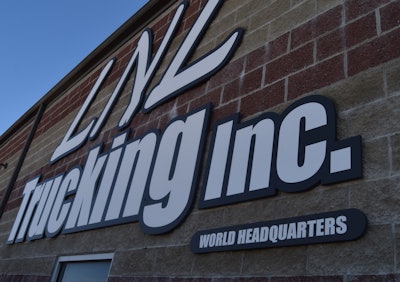 LNL's shingle out front on the shop/office building
LNL's shingle out front on the shop/office building
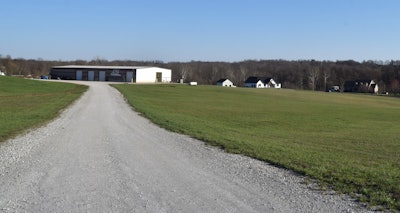 The expansive shop, with three drive-in bays, plenty space inside for parts storage and a modular office, and room for at least two more pull-in bays, sits on a beautiful parcel of land on U.S. 50 east of the center of town.
The expansive shop, with three drive-in bays, plenty space inside for parts storage and a modular office, and room for at least two more pull-in bays, sits on a beautiful parcel of land on U.S. 50 east of the center of town.
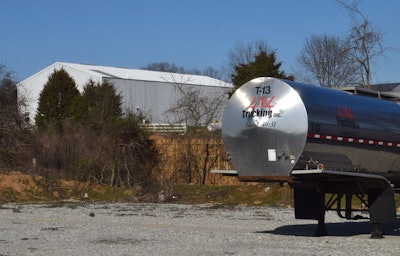 One of LNL's stainless, smooth-bore/rear-unload tankers is pictured here at the edge of the yard around company headquarters. The building in the background and to the left of the tanker is LNL's previous headquarters adjacent to the current headquarters property. LNL had outgrown that prior shop by 2020, when small fleet owner Limp moved into the current building, formerly a manufacturing facility for a company that built steel skeletons for modular buildings.
One of LNL's stainless, smooth-bore/rear-unload tankers is pictured here at the edge of the yard around company headquarters. The building in the background and to the left of the tanker is LNL's previous headquarters adjacent to the current headquarters property. LNL had outgrown that prior shop by 2020, when small fleet owner Limp moved into the current building, formerly a manufacturing facility for a company that built steel skeletons for modular buildings.
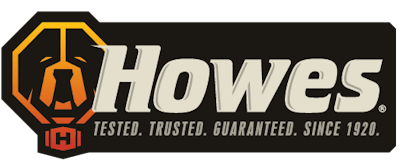 Overdrive Radio's sponsor is Howes, longtime provider of fuel treatments like its Howes Diesel Treat anti-gel and Lifeline rescue treatment to get you through the coldest temps, likewise its all-weather Diesel Defender, among other products.
Overdrive Radio's sponsor is Howes, longtime provider of fuel treatments like its Howes Diesel Treat anti-gel and Lifeline rescue treatment to get you through the coldest temps, likewise its all-weather Diesel Defender, among other products.
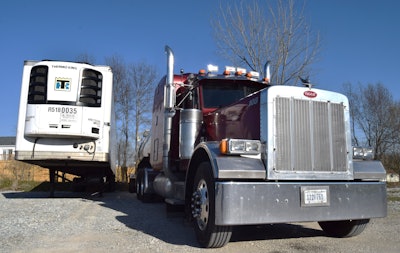 Here's the 2000 379 hooked to its 6,800-gallon Tremcar tanker. Yes, that's a reefer parked next to it, one of two that LNL is leasing with Premier Leasing to take advantage of freight opportunities to the side of the company's direct customers in animal-fat processors.
Here's the 2000 379 hooked to its 6,800-gallon Tremcar tanker. Yes, that's a reefer parked next to it, one of two that LNL is leasing with Premier Leasing to take advantage of freight opportunities to the side of the company's direct customers in animal-fat processors.
Keep tuned for more from Limp in future podcasts, and read more about his business via this link. Part of what you can expect? See below:
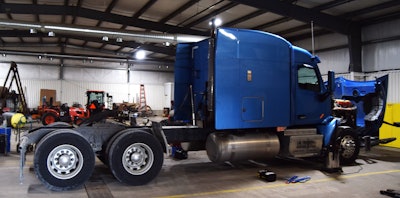 LNL and crew -- including maintenance head Wes Johnson -- were prepping one of the company's 2015 Peterbilt 579s for an out-of-frame overhaul, the first they've done on a Cummins ISX, Limp noted. There will certainly be more of those in their future, and the opportunity to learn is key for him. It’s something of a motto, in fact. “I can’t” is not in his vocabulary, he said, when it comes to obstacles. For trucking success, “adapt and overcome” are certainly words to live by.
LNL and crew -- including maintenance head Wes Johnson -- were prepping one of the company's 2015 Peterbilt 579s for an out-of-frame overhaul, the first they've done on a Cummins ISX, Limp noted. There will certainly be more of those in their future, and the opportunity to learn is key for him. It’s something of a motto, in fact. “I can’t” is not in his vocabulary, he said, when it comes to obstacles. For trucking success, “adapt and overcome” are certainly words to live by.
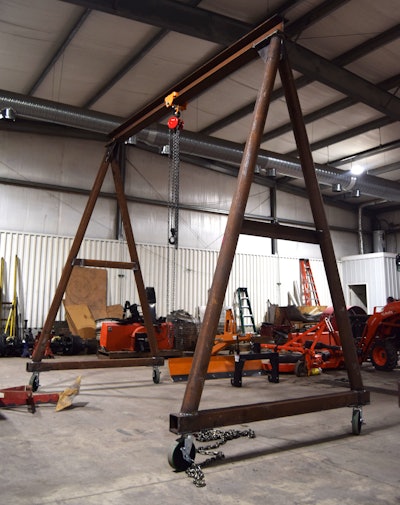 Adaptation in the case of the upcoming overhaul included building the tools to do the job, without having to rely as in past on a heavy-duty wrecker service to remove the engine. Larry Limp and crew built this gantry crane to hoist the engine out of the frame with Limp's brother, Joe, a master fabricator. How'd they do it? More on that later.
Adaptation in the case of the upcoming overhaul included building the tools to do the job, without having to rely as in past on a heavy-duty wrecker service to remove the engine. Larry Limp and crew built this gantry crane to hoist the engine out of the frame with Limp's brother, Joe, a master fabricator. How'd they do it? More on that later.
[Related: LNL Trucking minds the pennies, stacks up dollars in profit: Owner Larry Limp's strong foundation]
Larry Limp: Of course, as I get older, I like electronic logbooks better than what I would have when I was in my 20s. But now that I'm 63, I like that 10 hours off. You know? My work ethic really started to wane when I found out that feed mills were still open at noon. You didn't have to be there at 7:00 in the morning. You could arrive at noon and still unload.
Todd Dills: A little good humor? Yep, small fleet owner Larry Limp's got plenty of that. Overdrive's 2023 Small Fleet Champ in the 11-30 truck division, LNL Trucking has made a solid direct-customer business specializing mostly in animal fats, pulled in 6,800 gallon stainless tanks to supply businesses in various production chains, gear lubes, cutting oils, you name it. Based in Bedford, Indiana, Larry Limp's sense of humor has probably served him well in decidedly less humorous endeavors than contemplating his own psychology and the shift to electronic logs in 2017. That's sure. He served as chairman of the Indiana Motor Truck Association, participates annually in the IMTA's trips to Washington to visit with reps and senators, and generally keeps his nose to the grindstone building business. Hanging on to business might be the better phrase in the current environment. All of it done with a strong do-it-yourself ethic born of 40-some years in trucking, almost all of it as an owner/operator and then small fleet owner.
I'm Todd Dills. And ahead of the Mid-America Trucking Show in Louisville this week, I ventured about an hour and a half's drive north and west of the Kentucky town to Bedford, Indiana to LNL's shop in world headquarters on a beautiful parcel of land on us 50, east of the center of town. Limp, who still runs one of the rigs in the fleet of mostly Peterbilt 579s, was headed back from St. Louis after a delivery Tuesday morning pulled behind the longest serving Pete in the fleet. It's not a 579, but rather a 2000 Peterbilt 379, and that's partial too for a variety of reasons we'll hear about in this Overdrive Radio Edition for March 22, 2024, hitting overdriveonline.com/overdrive-radio then on March 25.
Larry Limp: I took a... It was prime burning lard oil, which is an ingredient... This place I went to, they make their own oils and it's just a base ingredient. It'll turn into a gear lube I'm certain or a cutting fluid.
Todd Dills: He picked up Monday evening, hauled out to St. Louis the same night to stage for morning unload.
Larry Limp: Our customer’s down at Jeffersonville. My load was supposed to have been ready at 7:00 last night. They finally got it loaded about 8:00, so I ran over last night. Where I deliver at, they don't... Their tank farm is all inside the building, so I just backed up to the dry docks whenever I got there last night and-
Todd Dills: Just waited till the morning?
Larry Limp: Yeah. Yeah, they did. They just got started. All I had to do was go top side and open up my dome lid. They done everything else.
Todd Dills: Then we sat down for a talk through the history of that 2000 379, ELD-exempt it turns out though he's running eLogs in it as in the rest of the fleet. Likewise, his history trucking marking time by major engine work.
Larry Limp: Four years later, the oil pump shaft broke.
Todd Dills: By truck model years and other big moves.
Larry Limp: I bought my first truck in 1984. Summer of 1984 I bought a White Road Commander cabover.
Todd Dills: And more after the break, so keep tuned.
Speaker 3: In order to keep your diesel vehicle moving this winter, you need to make sure that you have the products you can trust. Howes Diesel Treat has long been the number one product on the market to prevent gelling. But what if you forget to treat your fuel and find yourself stuck? Reach for Howes Diesel Lifeline, the only emergency rescue product available that's a hundred percent alcohol-free, fast acting, and easy to use. Diesel Lifeline is your security blanket on the road. Visit howesproducts.com.
Todd Dills: That's H-O-W-E-S. Howesproducts.com.
Big congrats are in order for trucker Josh Giesbrecht, operating out of Canada and longtime proprietor of his Trucker Josh video blogs on YouTube where he's built up a huge audience over more than a decade now bringing the reality of trucking to everyday folks otherwise uninitiated. Trucker Josh is the latest inductee to the Howes Hall of Fame built to recognize those inside trucking and farming communities making significant contributions to the business all told. Stay tuned for more for my talk with Trucker Josh at Matt's in a future podcast.
Now, here's Larry Limp picking up at the purchase of his longest serving truck in the LNL Trucking fleet today. That's the 2000 Pete 379 mentioned up top. Here we go.
Larry Limp: I bought that truck off of eBay in November of 2010.
Todd Dills: That's an interesting origin.
Larry Limp: I was needing a truck and the guy was really good with his pictures. I knew it had some hood damage. It had a little more hood damage than what the pictures made it look like, but bought it at... It had the hood damage, but it was still drivable. Got it home. It was about 980,000, something like that. It just a little short of a million when I bought it.
Todd Dills: Miles, that is.
Larry Limp: ECM is showing I think 2.4 or 2.5 million miles now. I got it home and found the right hand half of the hood on Craigslist. So I think that right hand half, which was the fender and the top part of it. I think it even had the headlight bucket on it. Got all that for like $750. Just had to drive back over to Central Illinois to get it. We were getting all of our stuff together to cut the hood apart and put it back together and it broke a crank record in home, full motor out of it.
Todd Dills: Oh, Jeez.
Larry Limp: Put a crank in it. It broke that, but it didn't do any damage to the block. It had to come out of the frame in order to put a crank in it anyway. And with 980,000 miles on it, it was, well, we'll just overhaul it. So we got that done and back to running and its Cat motor. I think it was four years later the oil pump shaft broke. Again, we were fortunate enough that even though it was a catastrophic failure, it didn't do any damage to the block. So we put another crank back in it. And I think it was October of '14 was when it was the last time that we were in that engine. In recent years I'm probably down to somewhere around 75,000 to 80,000 miles a year.
Yeah, I had drivers in it from the time we got it on the road there in December of '10 through probably through December of '19, I think.
About a 10-year timeframe there. It had a driver in at all time. According to ECM, we've put about 1.6 million on it since I bought it.
Todd Dills: Over all that time, 16 years and 1.6 million miles, those two cranks in the initial overhaul aren't the only bits of powertrain work in this engine scene.
Larry Limp: When we had to put the second crank in it, we went ahead and put new pistons lining it at that point in time. And then I think '21 we had to put a head on it because a cracked head. In all the years that I've owned Caterpillars, seemed like the weakest link is the heads just won't take getting hot.
Todd Dills: Today, though Limp's had Cats in his trucks going all the way back to some of his very first, the rest of the LNL fleet before the 2003 379 is powered by later model Cummins engines.
Larry Limp: Everything else except for that one truck, everything else is a ISX15 except for... I've got two day cabs that are 2020 models and I think they're an X15. I've got a '19 that I think is also an X15, which I'm plenty satisfied with the Cummins engine. It's the after treatment. I wish we could just take them off and throw them into the scrap heap of history and move away from that. It's just constant. I got an email this morning from a contact at Penske Leasing encouraging me to think about pre-ordering trucks because she was equating the 2027 motor to the dark days of 2010 when DPF first come out. And I kind of thought that sounded like an awful dark future for that motor. I guess it'll be great, but is it a rush to market? Maybe.
Todd Dills: We'll see. Right? Why do you hang on to the 2000 model?
Larry Limp: For the most part, it's trouble free.
Two years ago when I bought that 2019, I was kind of thinking about parking it then. And then I had second thoughts on that and put a driver in the 2019. But it's simple. Compared to the current engine criteria, it's simple. It's not as simple as Cats were back in the mechanical days, but it's a lot more dependable than a Cat was back in the mechanical days. But it's just, I enjoy driving it. I don't put drivers out in it. I enjoy driving it and I just feel it at home.
The first truck I drove on the road was a 1976 narrow cab, cab-over Freightliner. That heater worked fine in the summer, not so much in the winter. And you needed to wear a raincoat to drive it for all the water that come around the windshield on you. And it was a 290 Cummins with a 10 speed. And the guy drove 40. He done a good job about taking care of the maintenance. He's passed away now, but his name was Jim Edmister. And he had the truck leased to Shelly Motor Lines because Shelly had a terminal down here at Shoals hauling wallboard out of USG.
Todd Dills: In fact, I followed a flatbed north from Shoals, Indiana pulling just such a load toward Bedford on my way to meet Limp this week. I was about to compliment the operator's pristine tarping job on the load when Limp said this.
Nice tarp job on it.
Larry Limp: Yeah, there's a tarp service down there.
Todd Dills: Oh, okay. They got their tarp service. I see. I see.
So I assume I can't really laud the operator there. It's all about the tarp service.
Larry Limp: Probably the tarp service had it all squared away more so than the driver.
Todd Dills: Limp rolled out of there in that cab-over Freightliner 40 years ago with the small fleet of Jim Edmister leased on. Very small fleet that is.
Larry Limp: When I started with Jim, he was at two. And when I decided I was going to buy my own truck, he was up to three.
Todd Dills: And he was driving one of them [inaudible 00:12:46]-
Larry Limp: Yeah. A lot of stuff out of USG. Shelly had some runs out to the East Coast that were like particle board that had... Laminated particle board had a wood design on it. At that point in time, they were building the stadium in Indianapolis for the Colts, which I think it started out maybe the Hoosier Dome might've been the name of it. And we were loading rebar coming back to Indianapolis. We hauled a lot of rebar back off the East Coast. There was a place in the port of Wilmington called Ford Steel, and they made rebar and wire mesh looked like fence at the port of Wilmington, Delaware.
When Hoosier Dome fell off, then we started hauling wire back to a new GM plant that was being constructed at Hamtramck, Michigan. They had a mile square under roof. You know? Trucks be lined up maybe four or five blocks long waiting to get into the job site of the morning. And when they dispensed you off, somebody at the company that you were delivering to would meet you at the front gate and they'd leave you back in there and what you got inside that building. I mean, they wasn't nothing that was close quarters. It was big.
Todd Dills: So when did you decide to buy that first truck of yours?
Larry Limp: I bought my first truck in 1984. Summer of 1984 I bought a White Road Commander cab-over, another 290 with a 10 speed.
Todd Dills: It wasn't a new truck, I don't-
Larry Limp: No, no. I think it was a 79 model.
Todd Dills: And that was after having driven for how long?
Larry Limp: About two years.
I didn't have that truck very long and I traded it off for a 1977 conventional Kenworth. I haven't owned a cabover since. Yeah, when I started there was more cab-overs on the road than what there was conventionals. Now it's just occasionally you'll see a cab-over that's not ancient. I put some money down on a cab-over.
But trying to find finance for a cab-over, it wasn't-- It was a 2004 model.
Todd Dills: Oh, it was a new one? Okay. Newer one.
Larry Limp: Yeah, it was a ABC Wide World of Sports cabover Pete.
Over 110 inch cab, flat floor. I mean, it was a nice truck, but nobody wanted [inaudible 00:15:59] note on it because as soon as you sign that paperwork, it's worth nothing.
Todd Dills: Back in the 1980s when Limp bought the White Road Commander, he wasn't exactly prepared for what he was getting into, he said.
Larry Limp: It was a struggle. I wasn't really ready to make the move. It was a struggle. Kind of one of those deals, what didn't kill you made you stronger deals.
And you better be prepared to learn quick because it was going to come at you fast.
Todd Dills: He'd split with Jim Edmister about the time of the first truck purchase. Then they would end up colleagues of a fashion with another outfit.
Larry Limp: When I bought the truck, because about the same time he had left Shelly Motor Lines, and we both ended up down at Eckmiller at Rockport Indiana, which Eckmiller is no longer around anymore either. They had agents in every state.
I mean, they were a pretty good size operation. And I don't know, they may have had 10, 15 trucks that were company trucks and the rest of the fleet was all owner operators or small fleets leased to them. That was mostly steel and aluminum there because there was, down at Rockport or Rockport, Owensboro area, Alcoa had a plant at Newburgh, Indiana. And then there was a Green River Steel, was in Owensboro. And then there was another aluminum plant at Lewis Court, Kentucky and I can't remember the name of it. Most of that work there was kind of Midwest to the South, kind of a triangle.
Todd Dills: That's all flatbed work in your early years, huh?
Larry Limp: Yeah.
Well, divorce came in there somewhere. And I got out of the truck and sold out the truck and business and worked for a truck dealer up at Indianapolis for a couple of years. I wasn't in sales, so it was all right. I was I guess what you'd call a gopher. You know? He'd buy equipment somewhere and he'd send me with a drop deck to go get it to get back to Indianapolis. And then-
Todd Dills: And you were doing some driving... Did you work in the shop there at all? Not really?
Larry Limp: Not really. Nothing that was like for commercial. You know? It was just keeping up with the truck and trailer that I was using all the time. Tieco Truck Exchange.
Todd Dills: Tieco?
Larry Limp: T – I – E – C - O. Where Tieco was at is now a Quala wash location. It's the building has been converted over to a tank wash.
Todd Dills: You use it sometimes?
Larry Limp: Not very often. It's just we don't load anything up there. So I have been there. The guy that bought the building and turned it into a tank wash, it first opened up as a Circle City tank wash. It wasn't that many years, probably less than five. Quala wanted it worse than he wanted.
Todd Dills: In the early 1990s, Limp jumped back into trucking in a more conventional way with Central Trucking or CTI, then out of Edinburgh, Indiana.
Larry Limp: Started pulling tanks in October of '95. Paul Marcotte Farms at Momence, Illinois. A pretty good size farm operation up there, I'd say. In '95 they was probably close to 5,000 acres. All animal fat.
Todd Dills: That was animal fat. That's how you got into that?
Larry Limp: Yeah. Then I filed for my own authority in 2001.
Todd Dills: Just one year after the 2000 Peterbilt 379 Limp reserves as his personal truck was built.
Larry Limp: I bought the truck in 2010 because I needed a truck.
Its longevity around here just because of... If I've got to be away from the office, I don't want to be shut down because of after aftertreatment. You know? I don't run wild. I run an electronic logbook in it. Even though it's old enough, it's exempt. I could get by without running an electronic logbook. And when we went to an electronic logbook, we had to spend a significant amount of time in the dash to find the J1939 circuit because provider had to have that. You know? The truck doesn't have smart sensors on it like fuel gauges and that sort of stuff. But the J1939 was in play. It was already in the harness. We had to find it because the original diagnostic port that was on the truck was just a six pin. They said their system wouldn't work with a six pin. We had to have more wires than that.
So we dug around in there and we found them and they had voltage on them like they were supposed to have. So we changed the plug to a nine pin and plugged it all in and it worked. Of course, as I get older and I like electronic logbooks better than what I would have when I was in my 20s. But now that I'm 63, I like that 10 hours off. You know? My work ethic really started to wane when I found out that feed mills were still open at noon. You didn't have to be there at 7:00 in the morning. You could arrive at noon and still unload.
Todd Dills: Larry Limp, 2023 Small Fleet Champ. But despite that waning work ethic, as it were, in the intervening years went on to build on everything that had come before and grow LNL Trucking to what it is today. We've told that story, which you can find in our Small Fleet Champ series of profiles of last year's 10 semi finalists. Look for a link to that in the show notes for the podcast or go to overdriveonline.com/small-fleet-champ. Stay tuned for more from LNL Trucking owner Larry Limp, about the gantry crane he and his brother, master fabricator, Joe Limp, built themselves to pull a Cummins ISX out of a 579 for Larry and Crew to try their hands at their first overhaul that particular model of engine. There will certainly be more in their future on that score and the opportunity to learn is key for him.
It's something of a motto for Limp. "I can't, it's not an option," he said when it comes to overcoming obstacles. For trucking success, "adapt and overcome" are certainly words to live by. We'll hear more from small fleet owner Limp in the coming weeks, so keep tuned. Find pictures from the visit and the post that will house this podcast when it hits overdrive online.com on March 25, 2024. Thanks for listening.

